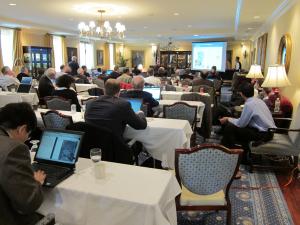Reviewing the fusion research landscape
10 Dec 2010
-
David Campbell, Directorate for Plasma Operation
The Fusion Power Associates during their 31st annual meeting in the Capitol Hill Club, Washington D.C.
The 31st annual meeting of the Fusion Power Associates took place in Washington D.C. on 1-2 December. The meeting brings together senior representatives of the US and international fusion communities and US policymakers to review the status of fusion research and consider the way ahead.
This year's meeting reviewed the fusion research landscape in the context of the approaching ignition experiments in the US's National Ignition Facility (NIF) and the progress on construction of ITER. The meeting therefore provided an excellent overview of the progress which is being made in fusion R&D towards the study of burning plasmas.
Many of the presentations from both the magnetic and inertial confinement communities reflected the universal awareness within these communities that future progress on fusion energy development towards the construction of fusion power plants depends heavily on advances in fusion technology. Proposals are being drawn up by the magnetic and inertial confinement communities for devices which can address key issues in the areas of fusion-relevant materials and reactor component testing, while taking the science of fusion energy forward into the burning plasma area.
The presentations made on these concepts provoked a lively discussion on the way ahead amid the recognition that the fusion community will have to work hard to secure the required funding for these ambitious, but necessary, projects in the current global economic situation.


